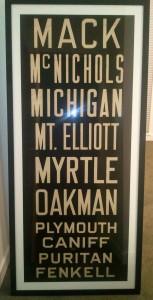Back in May, Bus Nerd’s mama (aka my Gail) gave him a subscription to a Detroit city magazine for his birthday. (As you might already know, the man is rather partial to his hometown.) In last month’s issue, there was a profile of an artist who makes replicas of old-school Detroit bus scrolls.
On the old busses and streetcars passengers learned of the various stops by way of signs on destination boxes [which] contained a continuous, two-sided canvas scroll with an alphabetized list of street names. The destination boxes were manually operated by the drivers and operators, using a hand crank.
I sort of hate to admit it, since this will no doubt brand me a “pseudo,”* but we ordered one. (How could we not? Buses + the D + history = goodness x 3.) We chose one that included the name of one of the streets Nerd lived near when he was growing up, so now he has a reminder of home (other than the Vernor’s ginger ale that occupies a full shelf in our refrigerator, that is) out here in the 206. But back to the scroll. Fellow bus chicks, behold:
Of course, being both a transit geek and a history lover, I was immediately compelled to research the specifics of how the scrolls worked. I didn’t learn much about that (MEHVA types: a little help, please?). What I did learn is that having a bus scroll (or, at least, a bus-scroll-like poster) in one’s home is apparently a “thing.” They’re everywhere on the internets—in Etsy shops and on dedicated sites galore. One of these sites encourages visitors to “design your own scroll for that special someone.”
If your special someone is a bus chick, you probably should.
***
* This is not a term for the bus glossary, since it’s not transit related (or transit inspired). It is, instead, a Saulty special. “Pseudo,” used as a noun in this case, essentially means a pretentious person. (My brother would provide a more colorful description, but I’m hoping you get the point.)





